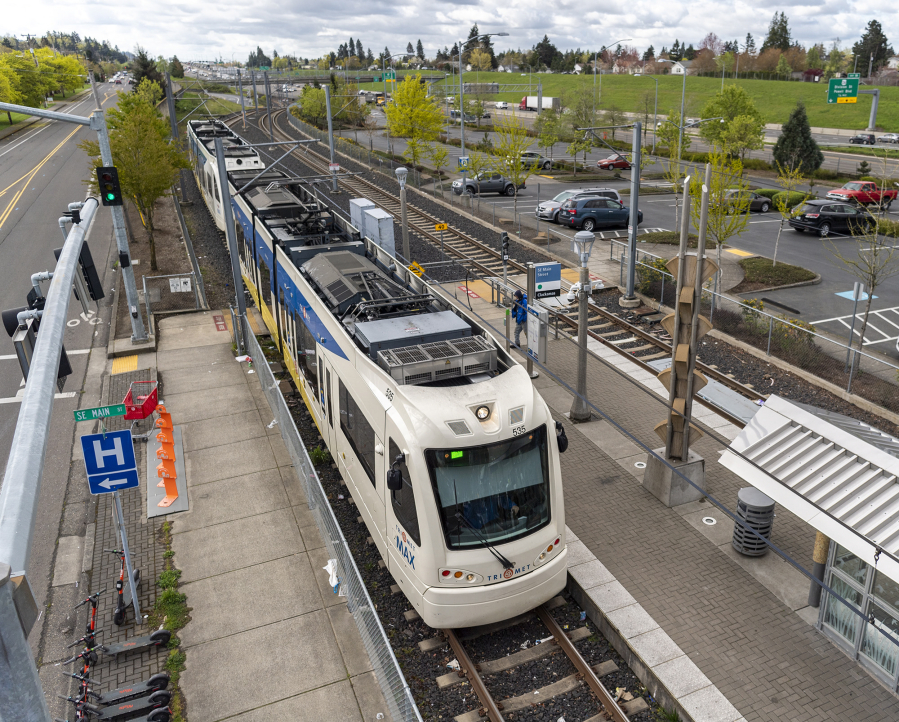Light rail has appeared on the ballot three times in Clark County, although voters have never been directly asked if they want to extend TriMet’s light rail system into Vancouver.
Aspects of light rail were on the ballot in 1995, 2012 and 2013. Each time, voters did not favor the proposal.
In all three cases, however, voters were not given a simple yes-or-no choice. Twice light rail was attached to a sales tax increase and a third vote came after the Columbia River Crossing was effectively on life support.
The three votes are cited by some officials, including U.S. Rep. Jaime Herrera Beutler, R-Battle Ground, and Clark County Councilor Gary Medvigy as the root of their opposition to light rail.
The Columbian revisited its archives to retell what happened with the three votes.
- 1995: A proposed light rail line from Clackamas Town Center to the Northeast 99th Street area of Hazel Dell was voted down by 67.8 percent of the 52,647 people that turned out.
The proposal included a 0.3 percent sales tax increase and a motor vehicle excise tax to pay for Clark County’s roughly $237.5 million share.
The sales tax would have increased from 7.6 to 7.9 percent in most of the county and the motor vehicle excise tax would have raised the cost of licensing a $20,000, year-old car by about $60 a year, from roughly $470 to $530. At that time, most of a vehicle’s license fee was an excise tax, which was reduced as the vehicle aged.
The MAX Green Line ended up running from Clackamas Town Center to Portland State University.
Groups including Identity Clark County did not support the measure, in spite of favoring the Columbia River Crossing and extending light rail to Vancouver. They argued that a sales tax increase was not the proper way to pay for light rail.
The question was indirectly worded because a proposed measure prohibiting the city of Vancouver from using any resources to promote light rail was struck down by a Clark County Superior Court judge because it exceeded the scope of local initiative power.
In the same election, however, pro-Columbia River Crossing candidates including Tim Leavitt, Jack Burkman, Alishia Topper and Anne McEnerny-Ogle were elected or reelected in Vancouver, illustrating the tension between the city and Clark County governments.
The impact of the advisory vote was marginal as the Washington State Legislature had balked at funding the Columbia River Crossing four months prior, effectively killing the project.
Looking forward
Light rail is included in the Interstate Bridge Replacement Program’s modified locally preferred alternative. Under it, MAX’s Yellow Line would be extended from the Portland Expo Center to Evergreen Boulevard in downtown Vancouver.
It is unclear how the extension would be funded. In its endorsement of the bridge project, C-Tran’s board said the agency will not be responsible for any of the costs of light rail operations and maintenance.
“We definitely want to see that connection with TriMet … but we also feel very strongly that Clark County should not be asked to cover the cost of the operations and maintenance of that facility because we don’t operate that mode, just like they don’t pay for the mode that we operate in downtown Portland,” C-Tran CEO Shawn Donaghy said.
“We’re certainly not asking TriMet not to do that,” he continued. “I think what we’ve said is, it’s the program’s responsibility to find the additional money to do that.”
Some opponents have asked how the extension of light rail to Clark County will affect crime. A 2017 study revealed that the majority of crime in the TriMet transit system occurred on light rail.
TriMet has a Transit Police Division, which is under the command of the Multnomah County, Ore., Sheriff’s Office, and it contracts with security officers.





